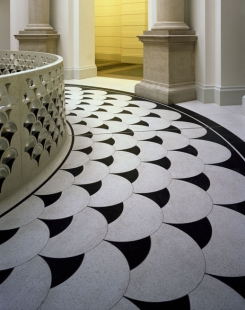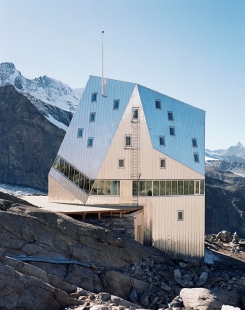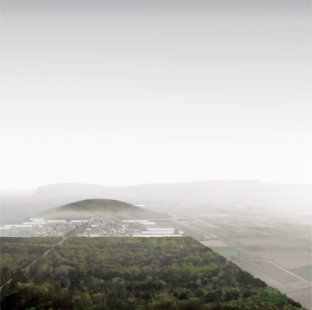
bread autumn 2014: Swiss-Czech inspiration
The Kruh Association and the Faculty of Architecture at ETH invite you to a cycle of lectures by prominent Swiss architects at the Světozor cinema in Prague.
Lectures will take place from October to December on the first Thursday of each month, are free of charge, and will be simultaneously translated into Czech. After each lecture, a working group will take place the following day (Friday) with the speakers and invited Czech experts at the headquarters of the Czech Chamber of Architects.
October / Thursday, October 2, 2014 - The autumn cycle will be opened by architectural theorist Laurent Stalder and architect Adam Caruso from London. Both share an interest in connecting the old with the new and a concern for context. The October lecture will also kick off the Architecture Day festival, which this year includes over 100 events on architecture across the country.
Laurent Stalder, professor of the history and theory of architecture at ETH Zurich, will speak on the current topic of contemporary architectural theory and practice: connecting the old with the new. The discussion will also address the inspiring architect of Czech origin Miroslav Šik, one of the most important representatives and promoters of contextual architecture - the so-called analogical school with a heightened focus on working with images and analogies, which emphasizes local context, simplicity, natural materials, and the connection of new and old forms without external effects. The lecture will also focus on the variability of the concept of autonomy.
Adam Caruso, a prominent London architect and professor of architecture at ETH Zurich, will address the difference between orthodox modernism and modern architecture in his lecture "The Deception of Modernism," which seeks to respond to contemporary culture in all its breadth.
Adam Caruso, along with his studio Caruso St John, is behind numerous remarkable public and private buildings. He avoids modernist and historicist clichés, and has a penchant for starkness and "timelessness" of expression. For the realization of the Walsall Gallery of Contemporary Art (2000) and the "Brick House" in London (2006), he was nominated for the Stirling Prize, the most prestigious British award for architects. Caruso St John is also responsible for the modernization of Tate Britain (2006-2013).
November / Thursday, November 6, 2014 - Architect Andrea Deplazes and renowned structural engineer Joseph Schwartz will present.
Award-winning architect Andrea Deplazes, professor of architecture and construction at ETH Zurich, is among other things the author of the acclaimed "bible" of architects on building construction (Architektur konstruieren: Vom Rohmaterial zum Bauwerk. Ein Handbuch). According to Deplazes, architecture should be purged of dogmas and individual handwriting; he perceives it as a series of possibilities and challenges. With his students, he designed the Monte Rosa hut in the Swiss Alps - a unique center of technological innovation and a refuge for climbers in one. The building, nicknamed "mountain crystal," is located at an altitude of 2883 meters. It is inaccessible by car or cable car, so it can only be seen by the most devoted fans of contemporary architecture. Deplazes is also known for his unconventional designs of houses made from various materials, ranging from wooden structures to concrete new builds.
Joseph Schwartz is a structural engineer and professor of structural design at ETH Zurich. He assists significant architects in realizing their visions. For example, he works with Christian Kerez, who spoke at Kruh's March lecture in a packed hall of 700 people. He participated in many of Kerez's projects, such as Kerez's "One-Wall House" in Zurich (2007). In the author's lecture "Visualization of Internal Forces in Structural Design," we will look at specific examples of how buildings arise where it is difficult to discern whether the architect's first thought or the structural design came first. Joseph Schwartz will guide the audience through the development of civil engineering science over the last two centuries, along with its implications for education and practice.
December / Thursday, December 4, 2014 - The cycle will conclude with Martino Tattara and Vesna Jovanovic from STUDIA BASEL. The lecture will address issues that Prague also faces, namely the development of free landscapes.
Studio Basel at ETH, a research institute focused on urbanism, city planning, and landscape, was co-founded in 1999 by the famous Herzog & de Meuron. Studio Basel has also presented multiple times at the Venice Architecture Biennale, for example, with research on the specificity of urbanism in Swiss cities and how it differs from, for instance, French or Chinese urbanism. Studio Basel explores fundamental questions: What is a city, what shapes its form and qualities? It reveals the urban "metabolism" and seeks to understand what the relationship between architecture and urbanism should be concerning the contemporary city.
Architect Martino Tattara heads ETH Basel, co-founded the studio Dogma in Brussels, and his theoretical work concerns the relationship between architecture and urbanism. He will present the current project of Studio Basel "Attention: Landscape" - concerning issues of land development, resource consumption, and potential solutions. The title refers to the 1955 call "Attention: Switzerland," in which Swiss intellectuals first warned against the uncontrolled expansion of urban fringes. This issue remains relevant nearly sixty years later, both in Switzerland and here. A new Metropolitian Plan has set forth that Prague must not expand further. From now on, untapped areas in the broader city center (Žižkov, Smíchov, etc.) should be developed and densified.
More information >
"Swiss-Czech Inspiration"
After a successful spring lecture series, during which the Světozor hall and the Faculty of Law were hopelessly filled with the public and architecture students, the KRUH association continues to reflect on current trends in Swiss architecture - one of the most inspiring architectures in Europe for a long time. It will again be presented to the audience by prominent figures from the ranks of architects and theorists of the prestigious ETH in Zurich. The project follows successful cycles presenting the architecture of individual European countries – the French, Spanish, and Dutch cycles.Lectures will take place from October to December on the first Thursday of each month, are free of charge, and will be simultaneously translated into Czech. After each lecture, a working group will take place the following day (Friday) with the speakers and invited Czech experts at the headquarters of the Czech Chamber of Architects.
October / Thursday, October 2, 2014 - The autumn cycle will be opened by architectural theorist Laurent Stalder and architect Adam Caruso from London. Both share an interest in connecting the old with the new and a concern for context. The October lecture will also kick off the Architecture Day festival, which this year includes over 100 events on architecture across the country.
Laurent Stalder, professor of the history and theory of architecture at ETH Zurich, will speak on the current topic of contemporary architectural theory and practice: connecting the old with the new. The discussion will also address the inspiring architect of Czech origin Miroslav Šik, one of the most important representatives and promoters of contextual architecture - the so-called analogical school with a heightened focus on working with images and analogies, which emphasizes local context, simplicity, natural materials, and the connection of new and old forms without external effects. The lecture will also focus on the variability of the concept of autonomy.
Adam Caruso, a prominent London architect and professor of architecture at ETH Zurich, will address the difference between orthodox modernism and modern architecture in his lecture "The Deception of Modernism," which seeks to respond to contemporary culture in all its breadth.
Adam Caruso, along with his studio Caruso St John, is behind numerous remarkable public and private buildings. He avoids modernist and historicist clichés, and has a penchant for starkness and "timelessness" of expression. For the realization of the Walsall Gallery of Contemporary Art (2000) and the "Brick House" in London (2006), he was nominated for the Stirling Prize, the most prestigious British award for architects. Caruso St John is also responsible for the modernization of Tate Britain (2006-2013).
November / Thursday, November 6, 2014 - Architect Andrea Deplazes and renowned structural engineer Joseph Schwartz will present.
Award-winning architect Andrea Deplazes, professor of architecture and construction at ETH Zurich, is among other things the author of the acclaimed "bible" of architects on building construction (Architektur konstruieren: Vom Rohmaterial zum Bauwerk. Ein Handbuch). According to Deplazes, architecture should be purged of dogmas and individual handwriting; he perceives it as a series of possibilities and challenges. With his students, he designed the Monte Rosa hut in the Swiss Alps - a unique center of technological innovation and a refuge for climbers in one. The building, nicknamed "mountain crystal," is located at an altitude of 2883 meters. It is inaccessible by car or cable car, so it can only be seen by the most devoted fans of contemporary architecture. Deplazes is also known for his unconventional designs of houses made from various materials, ranging from wooden structures to concrete new builds.
Joseph Schwartz is a structural engineer and professor of structural design at ETH Zurich. He assists significant architects in realizing their visions. For example, he works with Christian Kerez, who spoke at Kruh's March lecture in a packed hall of 700 people. He participated in many of Kerez's projects, such as Kerez's "One-Wall House" in Zurich (2007). In the author's lecture "Visualization of Internal Forces in Structural Design," we will look at specific examples of how buildings arise where it is difficult to discern whether the architect's first thought or the structural design came first. Joseph Schwartz will guide the audience through the development of civil engineering science over the last two centuries, along with its implications for education and practice.
December / Thursday, December 4, 2014 - The cycle will conclude with Martino Tattara and Vesna Jovanovic from STUDIA BASEL. The lecture will address issues that Prague also faces, namely the development of free landscapes.
Studio Basel at ETH, a research institute focused on urbanism, city planning, and landscape, was co-founded in 1999 by the famous Herzog & de Meuron. Studio Basel has also presented multiple times at the Venice Architecture Biennale, for example, with research on the specificity of urbanism in Swiss cities and how it differs from, for instance, French or Chinese urbanism. Studio Basel explores fundamental questions: What is a city, what shapes its form and qualities? It reveals the urban "metabolism" and seeks to understand what the relationship between architecture and urbanism should be concerning the contemporary city.
Architect Martino Tattara heads ETH Basel, co-founded the studio Dogma in Brussels, and his theoretical work concerns the relationship between architecture and urbanism. He will present the current project of Studio Basel "Attention: Landscape" - concerning issues of land development, resource consumption, and potential solutions. The title refers to the 1955 call "Attention: Switzerland," in which Swiss intellectuals first warned against the uncontrolled expansion of urban fringes. This issue remains relevant nearly sixty years later, both in Switzerland and here. A new Metropolitian Plan has set forth that Prague must not expand further. From now on, untapped areas in the broader city center (Žižkov, Smíchov, etc.) should be developed and densified.
More information >
The English translation is powered by AI tool. Switch to Czech to view the original text source.



0 comments
add comment
Related articles
0
21.08.2019 | kruh autumn 2019: Belgian architectural inspiration
0
01.03.2018 | bread spring 2018 : Marc Angélil + Raphael Zuber
0
07.01.2015 | To the lecture by Vesna Jovanović and Martino Tattary
0
04.12.2014 | <div>Circle Autumn 2014: Martino Tattara + Vesna Jovanović</div>
0
30.11.2014 | Invitation to the lecture by Petr Hájek and Martin Rajniš at ETH Zurich
0
10.11.2014 | Invitation to the lecture by A. Gebrian, D. Krause, and M. Steinbach at ETH Zurich
0
06.11.2014 | kruh autumn 2014: Andrea Deplazes + Joseph Schwartz
0
13.10.2014 | To the lecture of Laurent Stalder and Adam Carus
0
02.10.2014 | kruh autumn 2014: Adam Caruso + Laurent Stalder
0
05.06.2014 | bread spring 2014: Günther Vogt + Ákos Moravanszky
0
14.05.2014 | kruh spring 2014: Fabio Gramazio + Toni Kotnik
0
02.04.2014 | bread spring 2014: Philip Ursprung + Tom Emerson
0
06.03.2014 | kruh spring 2014: Christian Kerez
0
17.02.2014 | kruh spring 2014: Swiss-Czech inspiration




